 Deng Xiaoping: 'I have a clear conscience all my life'
Deng Xiaoping: 'I have a clear conscience all my life'
 Xi Jinping: 'The people are our strength'
Xi Jinping: 'The people are our strength'
 Amazing cliff diving in cold winter
Amazing cliff diving in cold winter
 Enjoy Sochi 2014 in slow motion
Enjoy Sochi 2014 in slow motion
 University student sentenced to death for poisoning roommate
University student sentenced to death for poisoning roommate
 Chinese lunar New Year celebrated in San Francisco
Chinese lunar New Year celebrated in San Francisco
 Taiwan Lantern Festival 2014
Taiwan Lantern Festival 2014
 Haiyang Yangge: make up
Haiyang Yangge: make up
 China's top 10 richest cities
China's top 10 richest cities
BEIJING, Feb. 27 -- Tourism in China's northern regions is reeling from "smog week," as a thick blanket of haze covered Beijing, Tianjin, and Hebei Province from Feb. 20 to Feb. 26.
"Standing in smoggy Tiananmen Square, you can't even see the portrait of Chairman Mao," users on China's online communities joked.
The joke is all too real for tourists in Beijing, who have been hit by haze at the city's attractions despite efforts by authorities to alleviate the air pollution through factory shutdowns and other measures.
"The smog here is too much for me," said a tourist surnamed Li from Hubei Province. He was among a few tourists in Tiananmen Square during the "smog week." After taking several snap shots, he decided to leave.
The Forbidden City, one of the most popular sights in Beijing, only received 17,400 visitors on Tuesday and 11,200 on Monday, according to the Beijing Municipal Commission of Tourism Development. In 2013, the iconic palace attracted an average of 41,000 each day and a record of 175,000 on Oct. 2.
According to the Beijing Statistics Bureau (BSB), Beijing saw an inbound tourist volume of 233,000 in January 2014, down by 21.7 percent year on year. The drop mainly came from Hong Kong, Macao and Taiwan, whose tourist turnover was 41,000, a 31.2 percent decrease, and neighboring countries such as Korea and Japan, with tourist volume of 25,000 and 14,000 respectively, down by 19.4 percent and 20.8 percent.
Liu Simin, a researcher with the Tourism Research Center of the Chinese Academy of Social Sciences, believes the smoggy weather has a greater influence on short-range travelers such as tourists from Japan and Korea.
"Unlike tourists from Europe and America, who plan their trips at least one month in advance, those from Japan and Korea are more concerned by the air condition. The smog would probably make them change their plans," Liu added.
The market seems to have a mixed response, as Beijing's travel agencies try their best to cushion the impact.
Zhang Guohua, a tour guide from China Travel Service's foreign travel group, said his job description now includes providing smog information and free smog masks to inbound tourists.
Simon from France was also taking photos in Tiananmen Square. He said he would not tell his friends to cancel trips to Beijing because of the smog.
"A short-term trip won't have much impact on health, and you can find many places indoors to visit in Beijing," Simon said.
According to CITS and CYTS, China's top travel agencies, so far there have been no group cancellations in the Beijing, Tianjin and Hebei markets. But no one knows how many potential tourists will shy away due to the weather.
The Great Wall at Badaling, another hot spot in Beijing, also saw a decrease in visitor volume during this week's smog. However, the site has received over 500,000 people since Jan. 1, 2014, a 30-percent increase compared with the same period in 2013.
In the longer term, tourism industry insiders agree that smog could worsen market prospects.
"The smog already had a negative impact on the tourism market in 2013, especially for the inbound market," said Zhai Yi, general manager of the overseas marketing department at CYTS.
Beijing recorded 46 smoggy days in the first 100 days of 2013, setting a new 60-year record. The BSB said Beijing's domestic and inbound tourist turnover decreased by 8.9 percent and 27.5 percent in 2013 respectively.
Zhai added that the beginning of the year is the tourism off-season, as foreign tourists usually make travel plans for after March, but the foreign media's reports on smog could eventually change their decisions.
Professor Han Yuling of the School of Tourism Management at Beijing International Studies University agrees. He believes that although there is no quantitative evidence to prove smoggy weather leads to a drop in inbound travelers, the Beijing market is influenced by this factor.
"Many Russians once chose Beijing as their first destination, but now they have shifted to Shanghai after the smog hit Beijing," Han said.
The Beijing authorities have reportedly pledged 760 billion yuan (125 billion U.S. dollars) to improving the air quality by 2017. But the lingering smog has become a hindrance in impressing foreign visitors.
On Tripadvisor, a popular global travel site, "Beijing air condition" and "smog" have become hot topics. Many travelers with plans to visit Beijing said they will monitor the air quality information in Beijing and bring masks during the trip.
"I will check out Beijing' s air monitor website as departure day is coming," wrote Noelene from Australia on another travel website. "Anyway we will go to Beijing as planned, just need more preparation."
 Chinese Dream: the Chinese Spirit and the Chinese Way
Chinese Dream: the Chinese Spirit and the Chinese Way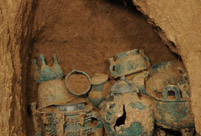 51 bronze sacrificial utensils unearthed in Shaanxi
51 bronze sacrificial utensils unearthed in Shaanxi Most gorgeous female celebs in Chi-pao
Most gorgeous female celebs in Chi-pao Second round of test kicks off at Beijing Film Academy
Second round of test kicks off at Beijing Film Academy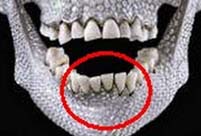 Ancient Qiang people had vertically grown teeth
Ancient Qiang people had vertically grown teeth Top 10 Chinese youth’s favorite seaside destinations
Top 10 Chinese youth’s favorite seaside destinations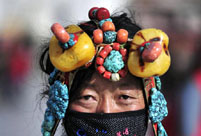 Traditional Tibetan clothing tailors
Traditional Tibetan clothing tailors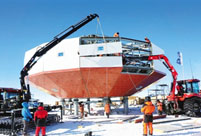 In photos: Unveiling Taishan station
In photos: Unveiling Taishan station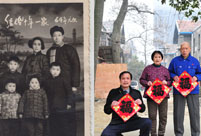 Beautiful moments of family reunion
Beautiful moments of family reunion Chinese warplanes C919 to appear at Singapore Airshow
Chinese warplanes C919 to appear at Singapore Airshow Ruins of Shang Dynasty's structure unearthed in Shaanxi
Ruins of Shang Dynasty's structure unearthed in Shaanxi  Intercity high speed train in operation
Intercity high speed train in operation Severe coldness freezes large parts of China
Severe coldness freezes large parts of China  Beautiful moments of Sochi
Beautiful moments of Sochi  It's not just performing this year
It's not just performing this yearDay|Week|Month